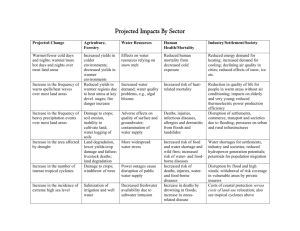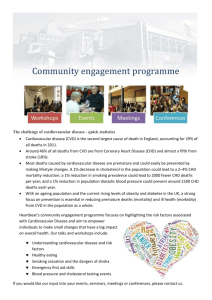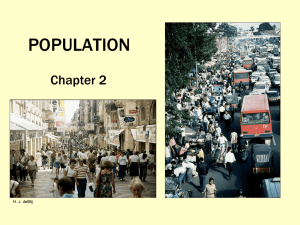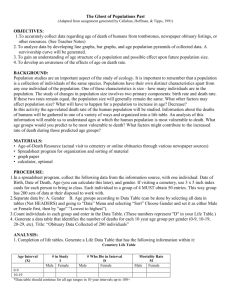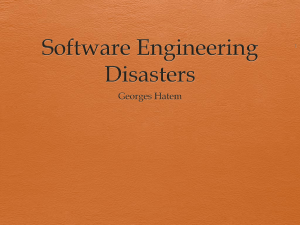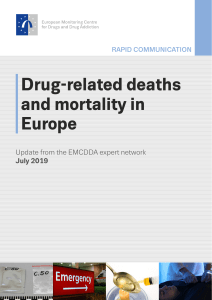DRID Workshop 4 - Diagnostic testing prevalence data
advertisement
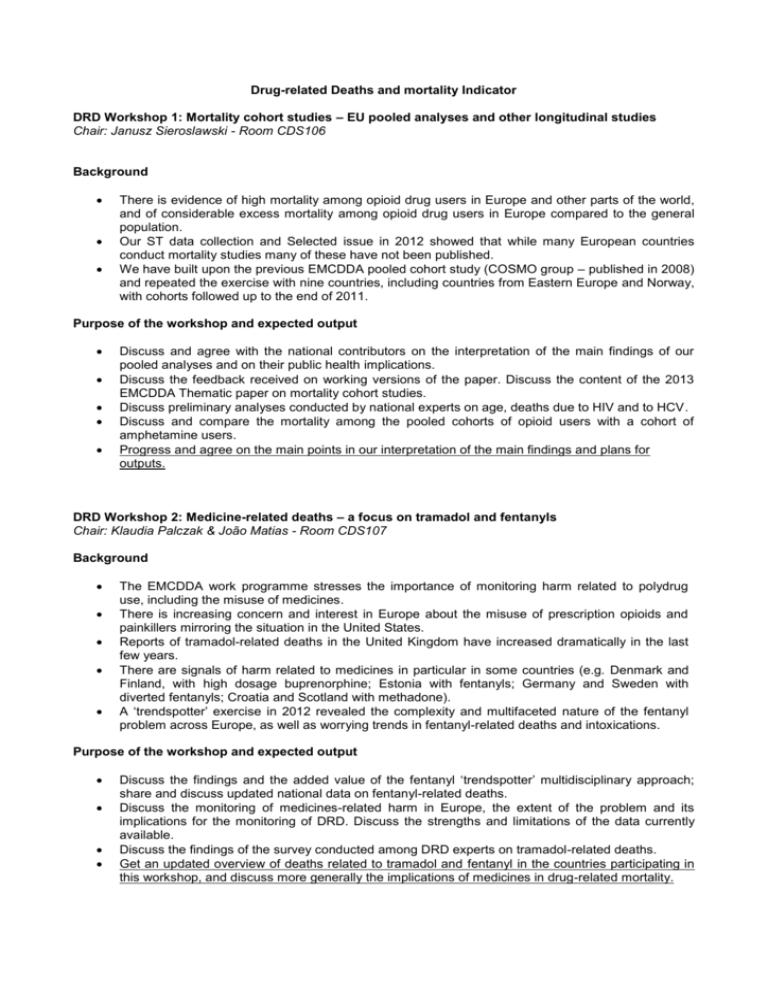
Drug-related Deaths and mortality Indicator DRD Workshop 1: Mortality cohort studies – EU pooled analyses and other longitudinal studies Chair: Janusz Sieroslawski - Room CDS106 Background There is evidence of high mortality among opioid drug users in Europe and other parts of the world, and of considerable excess mortality among opioid drug users in Europe compared to the general population. Our ST data collection and Selected issue in 2012 showed that while many European countries conduct mortality studies many of these have not been published. We have built upon the previous EMCDDA pooled cohort study (COSMO group – published in 2008) and repeated the exercise with nine countries, including countries from Eastern Europe and Norway, with cohorts followed up to the end of 2011. Purpose of the workshop and expected output Discuss and agree with the national contributors on the interpretation of the main findings of our pooled analyses and on their public health implications. Discuss the feedback received on working versions of the paper. Discuss the content of the 2013 EMCDDA Thematic paper on mortality cohort studies. Discuss preliminary analyses conducted by national experts on age, deaths due to HIV and to HCV. Discuss and compare the mortality among the pooled cohorts of opioid users with a cohort of amphetamine users. Progress and agree on the main points in our interpretation of the main findings and plans for outputs. DRD Workshop 2: Medicine-related deaths – a focus on tramadol and fentanyls Chair: Klaudia Palczak & João Matias - Room CDS107 Background The EMCDDA work programme stresses the importance of monitoring harm related to polydrug use, including the misuse of medicines. There is increasing concern and interest in Europe about the misuse of prescription opioids and painkillers mirroring the situation in the United States. Reports of tramadol-related deaths in the United Kingdom have increased dramatically in the last few years. There are signals of harm related to medicines in particular in some countries (e.g. Denmark and Finland, with high dosage buprenorphine; Estonia with fentanyls; Germany and Sweden with diverted fentanyls; Croatia and Scotland with methadone). A ‘trendspotter’ exercise in 2012 revealed the complexity and multifaceted nature of the fentanyl problem across Europe, as well as worrying trends in fentanyl-related deaths and intoxications. Purpose of the workshop and expected output Discuss the findings and the added value of the fentanyl ‘trendspotter’ multidisciplinary approach; share and discuss updated national data on fentanyl-related deaths. Discuss the monitoring of medicines-related harm in Europe, the extent of the problem and its implications for the monitoring of DRD. Discuss the strengths and limitations of the data currently available. Discuss the findings of the survey conducted among DRD experts on tramadol-related deaths. Get an updated overview of deaths related to tramadol and fentanyl in the countries participating in this workshop, and discuss more generally the implications of medicines in drug-related mortality. DRD Workshop 3: Enhanced monitoring of acute emergencies – focus on cannabis/cannabinoids Chair: Isabelle Giraudon - Room CDS107 Background The EMCDDA work programme stresses the importance of enhancing the use of acute emergency data to improve the monitoring of drug-related harm. One line of work is the monitoring of the implication of recreational drugs – and of new psychoactive substances in particular – in acute emergency settings. It relies on case-based surveillance (like the Euro-DEN EU-funded survey). Another line of work focuses on more ‘established’ drugs of abuse, and relies on surveillance of aggregated data. It aims to improve the data reporting system for monitoring purposes and to complement other indicators (TDI, PDU, deaths, seizures, and markets) in a timely and reactive way. It can rely on sentinel, ad hoc or ‘routine’ national data sources. The analysis of emergency data (number, demographics and trends) was conducted last year on cocaine-related emergencies, leading to a publication. Priority is given this year to cannabis, due to its high prevalence of use, the occurrence of acute intoxications, and emerging concerns and interest about synthetic cannabinoids in some countries. Purpose of the workshop and expected output Discuss the recent trends in cannabis-related emergencies in some countries, in particular the Czech Republic, Denmark, Spain and the Netherlands. Discuss the systems in place for the monitoring and reporting on acute intoxications in countries (Spain and the Netherlands in particular, as complex and ad hoc systems are in place). Discuss the possible involvement of poison centres, where they contribute to the monitoring. Discuss the limitations of the data currently available. Discuss the possible way forward for a useful European monitoring of acute drug poisonings, based on the reporting of aggregated data. Discuss links, differences and complementarity with case-based studies like Euro-DEN. Get an initial mapping of the data available and gaps and of recent trends on cannabis-related acute poisoning, building upon the analyses conducted with the DRD experts on cocaine. DRD Workshop 4: Underestimation and cross-validation of drug-induced deaths data Chair: Danica Thanki - Room CDS106 Background The EMCDDA protocol on DRD recommends that, where possible, several sources of data are used to analyse and report drug-induced deaths. Data from other sources such as forensic reports, police and coroners can complement the data from the general mortality registers. They allow crosschecking of the numbers and trends in reported drug-induced deaths. Some countries signal problems of underestimation, under-ascertainment, under-reporting, or nonnational coverage of the data sources. Most of the 30 countries base their report on several sources and are able to conduct these crossvalidations and analyses. Several countries have already done so. Purpose of the workshop and expected output Discuss the experiences, studies and validations done in several countries, using the experiences in France, Slovakia and Turkey. Discuss some of the main limitations and challenges, including confidentiality, coding of the causes of deaths, death certificates uncompleted, decreasing level of autopsies, cases under investigation, changes in the surveillance systems where participation is voluntary. Get an insight into the possibilities to question and improve the monitoring of drug-induced death data. Share good practices and innovative approaches among national experts.
